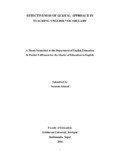Please use this identifier to cite or link to this item:
https://elibrary.tucl.edu.np/handle/123456789/1949| Title: | Effectiveness of Lexical Approach In Teaching English Vocabulary |
| Authors: | Khanal, Namrata |
| Keywords: | Vocabulary;Teaching methods;Language |
| Issue Date: | 2016 |
| Publisher: | Faculty of Education Tribhuvan University, Kirtipur Kathmandu, Nepal |
| Abstract: | This research entitled Effectiveness of Lexical Approach in Teaching Vocabulary was an attempt to find out the effectiveness of lexical approach in vocabulary teaching in the English language classroom. To carry out this research work, 40 students studying at grade 8 in Shree Dharma Secondary School, Bhimad 1 Tanahun, were selected as sample of the study and they were selected purposively. A set of test item was constructed selecting the vocabularies from grade 8 textbook as the tool for collecting required data. Before starting experimental teaching, the students were pre-tested to determine their proficiency level in vocabulary items. They were divided into odd and even ranking on the basis of the performance of the pre-test. As it was experimental research, the two groups were named as experimental and control group. The intervention using lexical approach continued for 26 days to the experimental group. On the other hand, the control group was taught using vocabulary through the use of classical approach and techniques like translation, definition. After the completion of one month intervention, posttest was undertaken using the same pre-test items. The results of both pre-test and post-test were compared to determine the effectiveness of two different techniques. In result, experimental group excelled control group in post-test. So, it is evident that vocabulary items taught through the use of lexical approach showed significant progress in the vocabulary achievement of the student. This research work has been divided into five different chapters. The first chapter is the introduction which deals with the background of the study,objectives of the study, research questions, significance and limitations of the study and operational definitions of the key terms. The Second chapter deals with review of the related literatures and conceptual frame work of the study. The third chapter deals with the research methodology under which research design, population of the study, sample and sampling strategies were included. It also consists study area/field, tools for data collection, its procedures and at 9 last data analysis and interpretation procedures. Similarly, the fourth chapter consists of analysis and interpretation of result and summary of the findings. The fifth chapter includes conclusion and recommendations of the study. The Recommendations are provided to the policy makers, practitioners and further researchers. |
| URI: | http://elibrary.tucl.edu.np/handle/123456789/1949 |
| Appears in Collections: | English Language Education |
Items in DSpace are protected by copyright, with all rights reserved, unless otherwise indicated.

